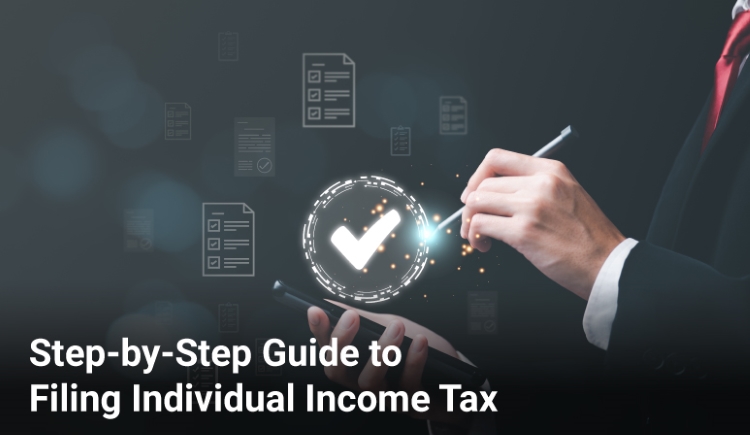Individual income tax may be a critical component of personal finance and tax compliance. Understanding what it is, who should record, and how to record accurately guarantees you stay compliant with tax authorities. This article gives an outline of person wage tax, counting recording prerequisites, due dates, punishments for late recording, and a step-by-step direct to recording your tax return.
What is Individual Income Tax?

What is Individual Income Tax?
Individual income tax may be a tax levied on the profit of people, counting compensation, pay rates, profits, intrigued, and other sources of pay. Governments collect this tax to finance open administrations, foundation, and national costs. Ordinarily, the charge framework is dynamic, meaning that the tax rate increments as the taxpayer's salary increments.
Citizens must report their wage every year, calculate their assess risk, and pay any charges owed. Depending on the nation or locale, citizens may be qualified for different findings, credits, and exclusions that can reduce their taxable income and overall tax burden.
Who Needs to File an Individual Income Tax Return?

Who Needs to File an Individual Income Tax Return?
The necessity to record an person wage assess return depends on a few variables, counting:
- Income Level: Most nations set a least salary edge. On the off chance that your salary surpasses this edge, you must file a tax return. The limit changes by nation and is frequently balanced for inflation.
- Filing Status: Your conjugal status, age, and whether you'll be able be claimed as a subordinate by another citizen can influence your filing necessities.
- Sources of Income: Individuals with assorted wage sources, such as self-employment, investments, or rental salary, may have to be record a return indeed in case their add up to salary is underneath the common edge.
- Special Circumstances: A few citizens must record a return to claim tax refunds, apply for particular credits, or address uncommon tax situations.
Deadlines and Penalties for Late Filing Individual Income Tax
Filing individual income tax returns on time is basic to dodge punishments and intrigued charges. Here are a few key focuses to consider:
- Filing Deadline: Most nations set an yearly due date for recording wage tax returns, regularly by the conclusion of April. Check together with your neighborhood assess specialist for the particular date appropriate to your jurisdiction.
- Extensions: A few nations permit taxpayers to ask for an expansion for filing their returns. Extensions allow extra time to record the return but regularly don't expand the time to pay any charges owed.
- Penalties for Late Filing: Lost the recording due date can result in punishments based on the sum of charge owed and the term of the delay. Punishments can incorporate late recording expenses and intrigued on unpaid charges.
- Avoiding Penalties: To maintain a strategic distance from punishments, record your return on time or request an extension in the event that is required. Pay any assessed charges owed to play down intrigued charges.
Step-by-Step Guide to Filing Individual Income Tax

Step-by-Step Guide to Filing Individual Income Tax
Filing your individual income tax return can be straightforward if you follow these steps:
- Gather Documentation:
- Collect all pertinent archives, counting salary explanations (such as W-2 or 1099 shapes), intrigued and profit explanations, and records of any findings or credits you arrange to claim.
- Determine Filing Status:
- Choose the appropriate filing status based on your marital status and household situation (e.g., single, married filing jointly, head of household).
- Calculate Gross Income:
- Add up all sources of income, including wages, self-employment income, rental income, and investment earnings.
- Claim Deductions and Credits:
- Recognize and claim any conclusions and credits you qualify for. Common findings incorporate contract intrigued, understudy credit intrigued, and charitable commitments. Credits may incorporate instruction credits or child tax credits.
- Calculate Tax Liability:
- Use the applicable tax rates to calculate your tax liability. Consider any prepayments or withholdings made during the year to determine the amount owed or refund due.
- Prepare and File the Return:
- Utilize tax preparation software, counsel a charge proficient, or physically fill out the specified shapes. Yield your completed return electronically or by means of mail to the fitting charge specialist.
- Pay Taxes Owed:
- If you owe taxes, arrange for payment by the filing deadline to avoid interest and penalties. Options include online payments, checks, or payment plans if necessary.
- Keep Records:
- Retain copies of your tax return and all supporting documentation for at least three years in case of audits or inquiries from tax authorities.
Conclusion
Understanding individual income tax and satisfying your recording commitments is basic for monetary soundness and legitimate compliance. By knowing who ought to record, understanding due dates, and following a step-by-step recording prepare, you'll oversee your charges effectively and maintain a strategic distance from potential pitfalls. Keep in mind to remain educated about changes in assess laws and counsel a assess proficient in case you've got particular questions or complex circumstances.



